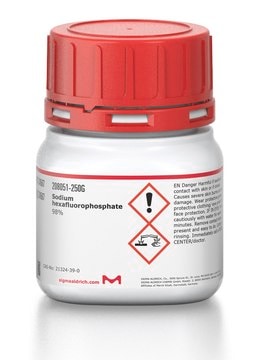450227
Lithium hexafluorophosphate
battery grade, ≥99.99% trace metals basis
Synonym(s):
Lithium phosphorus fluoride
About This Item
Recommended Products
grade
battery grade
Quality Level
Assay
≥99.99% trace metals basis
form
powder
greener alternative product characteristics
Design for Energy Efficiency
Learn more about the Principles of Green Chemistry.
sustainability
Greener Alternative Product
impurities
≤100.0 ppm Trace Metal Analysis
mp
200 °C (dec.) (lit.)
application(s)
battery manufacturing
greener alternative category
SMILES string
[Li+].F[P-](F)(F)(F)(F)F
InChI
1S/F6P.Li/c1-7(2,3,4,5)6;/q-1;+1
InChI key
AXPLOJNSKRXQPA-UHFFFAOYSA-N
Looking for similar products? Visit Product Comparison Guide
General description
Application
Other Notes
Preparation and characterization of lithium hexafluorophosphate for lithium-ion battery electrolyte.
related product
Signal Word
Danger
Hazard Statements
Precautionary Statements
Hazard Classifications
Acute Tox. 3 Oral - Skin Corr. 1A - STOT RE 1 Inhalation
Target Organs
Bone,Teeth
Storage Class Code
6.1B - Non-combustible acute toxic Cat. 1 and 2 / very toxic hazardous materials
WGK
WGK 2
Flash Point(F)
Not applicable
Flash Point(C)
Not applicable
Personal Protective Equipment
Choose from one of the most recent versions:
Already Own This Product?
Find documentation for the products that you have recently purchased in the Document Library.
Customers Also Viewed
Articles
HEVs address rising fuel costs and emissions concerns, utilizing battery packs alongside internal combustion engines for enhanced performance.
HEVs address rising fuel costs and emissions concerns, utilizing battery packs alongside internal combustion engines for enhanced performance.
HEVs address rising fuel costs and emissions concerns, utilizing battery packs alongside internal combustion engines for enhanced performance.
HEVs address rising fuel costs and emissions concerns, utilizing battery packs alongside internal combustion engines for enhanced performance.
Related Content
Batteries, fuel cells, and supercapacitors rely on electrochemical energy production. Understand their operation and electron/ion transport separation.
Batteries, fuel cells, and supercapacitors rely on electrochemical energy production. Understand their operation and electron/ion transport separation.
Batteries, fuel cells, and supercapacitors rely on electrochemical energy production. Understand their operation and electron/ion transport separation.
Batteries, fuel cells, and supercapacitors rely on electrochemical energy production. Understand their operation and electron/ion transport separation.
Our team of scientists has experience in all areas of research including Life Science, Material Science, Chemical Synthesis, Chromatography, Analytical and many others.
Contact Technical Service














